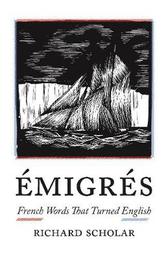
|
Emigres: French Words That Turned English
Hardback
Main Details
Description
English has borrowed more words from French than from any other modern foreign language. French words and phrases-such as a la mode, ennui, naivete and caprice-lend English a certain je-ne-sais-quoi that would otherwise elude the language. Richard Scholar examines the continuing history of untranslated French words in English and asks what these words reveal about the fertile but fraught relationship that England and France have long shared and that now entangles English- and French-speaking cultures all over the world. Emigres demonstrates that French borrowings have, over the centuries, 'turned' English in more ways than one. From the seventeenth-century polymath John Evelyn's complaint that English lacks 'words that do so fully express' the French ennui and naivete, to George W. Bush's purported claim that 'the French don't have a word for entrepreneur,' this unique history of English argues that French words have offered more than the mere seasoning of the occasional mot juste. They have established themselves as 'creolizing keywords' that both connect English speakers to-and separate them from-French. Moving from the realms of opera to ice cream, the book shows how migrant French words are never the same again for having ventured abroad, and how they complete English by reminding us that it is fundamentally incomplete. At a moment of resurgent nationalism in the English-speaking world, Emigres invites native Anglophone readers to consider how much we owe the French language and why so many of us remain ambivalent about the migrants in our midst.
Author Biography
Richard Scholar is Professor of French at Durham University. His books include The Je-Ne-Sais-Quoi in Early Modern Europe: Encounters with a Certain Something and Montaigne and the Art of Free-Thinking.
Reviews"Who needs ennui when we have old-fashioned boredom? . . . Scholar's emigres often manage to be posh and phoney at the same time, while still carrying a kind of precision it would be hard to find without them. . . . [In Emigres] words have historical lives and tell us stories we may not know how to hear."---Michael Wood, London Review of Books "A well-researched, convincing account of how our language has welcomed foreign words-but not always their native speakers." * Kirkus Reviews * "Scholar . . . reflects thoughtfully and sometimes surprisingly on the use of French words in English. . . . Given the current interest in immigration, Scholar's book on immigrant words is erudite, witty, and surprisingly timely." * Publishers Weekly * "Like the emigre lexical items themselves, Emigres crackles with hidden energy and is worth serious study." * Choice * "The emigres that Scholar highlights-a la mode, galanterie, naivete, ennui, and caprice-don't assimilate and, in this act of resistance, reveal new ways of being."---Meghan K. McGinley, AmeriQuests "This thoughtful summation of how much English owes to French, and other languages, has a certain je-ne-sais-quoi and cultural relevance."---David Caddy, Tears in the Fence "[A] lively and always entertaining book. . . . Although Professor Scholar clearly has a wealth of learning at his fingertips, enjoyment of Emigres need not be limited to academic readers. The book will be readily understood by academic and non-specialist readers alike. . . . The habit of using emigre words is infectious: for his sang-froid, savoir faire, and bonhomie in guiding us on this voyage through the complexities of our national love-hate relationship with French-and the French-we are all indebted to Richard Scholar."---Annette Tomarken, H-France Review "The 'emigres' of this engaging book . . . occupy an uneasy centre ground between donor and borrower language, being neither French nor fully integrated into English. This ambiguity, Richard Scholar argues, reflects a long-standing ambivalence in English cultural attitudes to things French, ranging from fascination to disdain. . . . The book takes us on an eclectic journey from Restoration comedy to Winnie-the-Pooh's companion Eeyore, John Le Carre and the Oscar-winning Little Miss Sunshine."---David Hornsby, Modern Language Review "Emigres . . . takes an approach informed by both French and English literature, and sets its findings in a cultural context which is wider still. This is pleasing, as the historical study of language perishes in a vacuum. . . . [A] humane and humanistic book."---Anthony Grant, French Studies "The dream of a primordial linguistic simplicity has a flip side: the fear of linguistic creolization followed by a loss of national identity. Richard Scholar's book exorcises this atavistic fear."---Maria Neklyudova, Shagi / Steps. "Fascinating and informative. His research is excellent, he writes clearly, and the book is full of charming and memorable detail . . . .[Scholar] has written a captivating book in an accessible style. It would be good if reading him became de rigueur among students of language and literature, but perhaps ca serait trop beau."---Alan Dent, Northern Review of Books
|